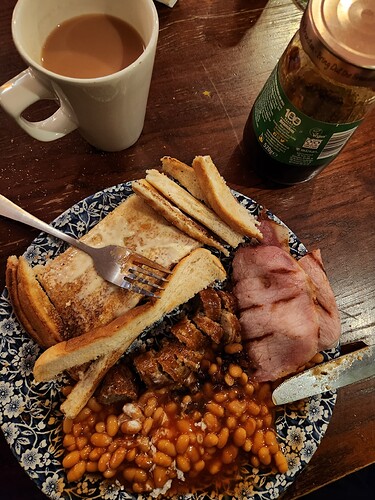@LaraPo, I’m about the same BMI as you and definitely always the thinnest person in any given situation. I know if I fall below or above certain weight range I do not feel well. I think as long as we feel well it’s fine to be on the lower end of the normal bmi scale. I don’t think we should compare ourselves to the people around us who are not doing similar things in longevity and health. I used to kind of freak out because the only people I saw who were thin were also frail and sick but I have to remind myself that that isn’t my situation! ![]()
While PEMF therapy might reduce bone loss for astronauts there are no long-term studies on the safety that I can find.
In fact, the jury is still out on the safety of exposure to unnecessary electromagnetic fields.
There are many who think it may be harmful.
“Conclusion: These results demonstrate that long-term exposure to PEMF can lead to oxidative damage of the liver and spleen.”
People have been using PEMF medical devices for decades with no reports of liver or spleen damage. Last year, Bemer became the first PEMF device to be approved by the FDA as a Class II medical device (all others are still Class I). Consequently, some healthcare professionals can now bill insurance for Bemer sessions.
Regarding your questioning of Bemer’s (or PEMF) ability & safety…and use related to bone health and bone metabolism. Orthopedic surgeons are now using PEMF to accelerate healing of non-union fractures (see studies below). I think PEMF’s ability to increase micro-capillary circulation is an important modality for people to consider for increasing lifespan and healthspan.
STUDY #1: Early application of pulsed electromagnetic field in the treatment of postoperative delayed union of long-bone fractures: a prospective randomized controlled study
https://www.ncbi.nlm.nih.gov/pmc/articles/PMC3556314/
STUDY #2: Pulsed electromagnetic fields for the treatment of tibial delayed unions and nonunions. A prospective clinical study and review of the literature
STUDY #3: Pulsed Electromagnetic Field Stimulation of Bone Healing and Joint Preservation: Cellular Mechanisms of Skeletal Response
STUDY #4: A follow-up study of the in-practice results of pulsed electromagnetic field therapy in the management of nonunion fractures
“To be fair, Rasputin didn’t die easily.”
His, are the secrets I want to know.
IN MY HUMBLE OPINION: ANYONE READING THIS WEBSITE AND IS INTERESTED IN INCREASING THEIR HEALTHSPAN SHOULD BE ON DEPRENYL(SELEGELINE). DR JOPHEZ KNOLL(from Buda Pest) spent 50 years studying neurochemistry of the deep ventral brain) invented the molecule of deprenyl that mimicked the MAO INHIBITORS-an enzyme responsible for breaking down used neurotransmitters.so they can be excreted. the release of these neurotransmitters causes mental stimulation and alertness.MAO levels tend to rise with age and one of them- DOPAMINE- tend to fall and is the cause of Parkinson’s disease- thus Deprenyl in high doses(20 mg)/day can ameliorate the Symptoms of Parkinson’s. In doing his studies of Wistar rats with deprenyl their life span was increased up to 40% in addition mediocre average rats became super rats as they aged. I recommend that you all go to the internet and look up: An Interview with Jacob Knoll. also look up “50 years of Deprenyl” from the Lee-Benner institute of California. The dose more 50’s and older would be 5mg/day–the generic name is Selegeline. This drug and this history has been overlooked and I personally at 88 take 10mg/day. I have to warn you there is a subtle aphrodisiac effect. Amazon Books has a recent book - the one with the
yellow jacket that explains the above–just read the last chapter unless you are a biology nerd like me. G BEST
MD-retired Anesthesiologist–am in training for the masters track POLE VAULT-my age group 85-90 world record is about 8 feet.
Now in my 5th year with Rapamycin 6 mg once a week- no side effects-lost 20 lbs in my first 6 months.
We have had a long conversation about deprenyl
See discussion here Deprenyl - Anti-Aging Drug Proven Effective in Dogs
Some of the key issues seem to be the complexity when you take other drugs and long term high dosing.
I’d like to see the ITP test it
Vince Giuliano uses, and has a positive review of a PEMF device.
Dr.Best,
The book you recommend is the title;
“How Selegiline ((-)-Deprenyl) Slows Brain Aging” by Joseph Knoll?
I’m coming late to this party, but doing a paper search for AAKG immediately yielded this:
“The major findings of this study were that acute ingestion of an AAKG supplement had no effect on muscular strength, endurance, or BLA concentration during resistance exercise in ROTC Cadets. These findings serve to support previous work by Fricke (7) and Greer (8) that demonstrated no ergogenic benefits with L-arginine ingestion.”
https://digitalcommons.wku.edu/cgi/viewcontent.cgi?article=1417&context=ijes
Now this was a 2013 shorter-term study (three weeks?) of 19 19-year-olds (humans) who were already in good shape (ROTC candidates, or maybe I’m making an assumption), and just looking at short term increase in exercise, but did do blood tests and results show no improvement. Their literature search was highly negative as well. I don’t know anything about this research team and would generally trust Matt Kaeberlein over some random researchers, but it is human data.
Obviously this isn’t “longevity”, but if the claim is “muscle building” etc. perhaps this is a strike against the claim?
I don’t mean to be a curmudgeon and I’m willing to “bio hack” but I’m also always looking to exclude supplements/drugs from my stack because I’m worried about side effects and unintended consequences. Obviously a nonessential amino acid is probably harmless. I’ve been doing the “carnivore diet” for two weeks now (after being keto for two years as a 53-year old) and I’ve already lost weight and gained muscle and added significant progress to heavy weight lifting — I don’t generally discuss it because it seems keto and carnivore are unpopular here and in longevity circles in general, but I’d guess I potentially may be getting enough AAKG from meat to negate the need for a supplement IF it was causing a positive outcome? My thought is I may want to pulse “muscle building” with “longevity” so I have a nice reservoir of muscle to carry me into my 80s and beyond and have full motion/function/mobility, and carnivore MAY help me get there. And then Rapamycin in the non-muscle building periods for “longevity”/autophagy/cleaning (which I haven’t started but am about to take the plunge and order from an Indian pharmacy). Just a hypothesis and not trying to be Gov. Arnold, but I’d like to have the muscle on me while I can still build it and carry it forward, rather than a true struggle when I am much older. I’m also doing lower GlyNAC doses daily but really don’t see any results (maybe my dose is too low?).
Separately: I want to thank you, @Agetron, for all your information and candor on this site — it is invaluable n=1 data for me to digest (although maybe a bit too much detail for me on your Scottish penis)…
Hey Eric,
Thanks for that… just had my coffee with AAKG, Glycine, and Collagen… AKG as something that he would research after rapamycin- Matt Kaeberlein. I trust him as he is a solid researcher… and defaults to no… he is not much of a maybe guy… if nothing… or questionable results. Will do more reading on current AAKG. I use it for repair and recovery… not to build like the guys who take it pre-work out…I take it post… after. Will see. At least it doesn’t hurt. As Peter Attia says hedging my health bet.
Like your approach to protein. My diet of lots of protein past 7 years… every other day… comes from I like steak… zero calcification in heart arteries… so dumb luck.
Again Matt and Peter really hammer on need for protein. Go to point 1:55:30
Glad you enjoy my N=1… Definitely all is working great at 64… soon to be 65 years - ugh. I think I have made some good guesses. Rapamycin, Acarbose, TRT, oral: Tadalafil, Minoxidil and Finasteride.
Fortunate to have a great GP…General Practioner - who works with me and my insurance on all the above… no issues as long as my physical appearance and blood works shows I am healthy.
Did you read the title?
Acute Ingestion of L-Arginine Alpha-Ketoglutarate Fails To
Improve Muscular Strength and Endurance in ROTC Cadets
Acute dose is a single dose. That is confirmed by the discussion (page 5, 2nd paragraph).
The lack of ergogenic benefits may indicate that chronic use of L-arginine supplementation may be necessary for improved muscular performance. NO has been shown to reduce contractile force in mammalian skeletal muscle, thus a single dose may be inadequate to achieve acute changes in 1RM strength (13). Campbell et al. (3) did observe increased 1RM bench press strength in well-trained participants after 8 weeks of AAKG supplementation (12 g per day).
Further confirmed on page 6, where they referred to the study of Chinese scientists dosing for three day.s
There are also general limitations with this study. First, L-arginine and NO production were not measured in the blood stream, thereby limiting our ability to measure oral AAKG efficacy. Secondly, an acute dose of AAKG may not be sufficient to facilitate an ergogenic effect in normal healthy individuals (10). Liu et al. (9) reported no significant difference in plasma NO2 and NO3 concentrations after orally supplementing ten healthy male athletes with 3000 mg of L-arginine or placebo for 3 days
Thanks, @JuanDaw — I obviously did a bad job of reading. Maybe I missed it but I thought they did this “one time per week” test three times over three weeks, and stand corrected regardless. Plus they were already healthy (and young). And I definitely missed the “ Campbell et al. (3) did observe increased 1RM bench press strength in well-trained participants after 8 weeks of AAKG supplementation (12 g per day).” although that seems a somewhat higher dose than others are taking (again, maybe missed it?). I’d love an increase in bench press strength… I actually attached the paper because it had a large background discussion on many studies that found little for AAKG, not for the specific study they completed.
I’m not making a recommendation for you or others. I know less-than-nothing on AAKG and just looked it up after reading this in the forum (which is why I love this forum: it brings me new topics and possible supplements/drugs to begin research). Nor am I an expert here (obviously, given my misses). But there are a number of other supplements which supposedly positively impact strength training and recovery, many which are well-studied — leucine, glycine, creatine, acetylCoA, glycine, etc. (Workout Supplements | The Nutrition Source | Harvard T.H. Chan School of Public Health as one basic list).
I like the Matt K is interested in AAKG, and wonder: does he take it, or is just intellectually interested?
Are you taking it? (Forgive me if I missed your discussion on it). Have you noticed an n=1 impact?
For me, it’s not a big deal: I’m getting most of these in decent bioavailable quantities in the meat I eat (including AAKG if I’m not mistaken?), and it’s definitely working for me (everyone is different). I’ll never know which was the impactful compound in my n=1 since I’m having them all together. As along as the cholesterol isn’t killing me, my biggest longevity concern is cancer and this is generally decent for prevention (keto is better). The one BCAA I take separately is Glycine in GlyNAC and I must be honest I haven’t detected any noticeable benefit (I think my dose is too low but I’m conservative). I’ll try for a year and see what happens.
I’m torn a bit on protein (even though I’m trying carnivore so I’m obviously making a “bio hacking” bet here): I hear longevity experts talk about how plant protein is better for longevity (with lots of data), Dr Gundry with his meat sugar belief, and Walter Longo has clinical data than his Fasting Mimicking Diet positively impacts health. But I also look at many of the longevity experts and they seem on a pathway to sarcopenia: my father died early in part from sarcopenia (it at least negatively impacted his last 20 years) so I’d like to have a good muscle base from which to focus on longevity (which ideally will involve backpacking into my 80’s). I look at the carnivore guys and they look, well, more SOLID (not sure about all cause mortality).
I’m betting that I can build muscle one month per quarter, (carnivore and heavy weights) and then longevity the following two (rapa, low insulin via keto, and maybe more), and repeat every quarter: two steps forward, one step back in muscle building, and the same two forward, one back in longevity may lead to a better overall quality of life as well as some decent longevity (at least versus SAD). It should hold back cancer development risk (keto) and the exercise should help cardiovascular risks, so two big ones down. I’ll let you know in a few years after my experimentation here.
I know this isn’t popular here, and not trying to convert anyone: I thought this is a place to share our strategies and basis thereof.
As Matt K. and Peter A. on their “Nutrition” podcast state - everyone is different and there is no one perfect diet for everyone. So, give it a try!
Hopefully the rapamycin will keep the cancer off your chronic disease list and same for sarcopenia. I can definitely vouch that I am both more muscled and significantly stronger than when I was 59… just 6-years ago! Good health/life journey.
I am happy with my results on a diet which is not really linked to any particular faction. I think the key is to get the right inputs when including supplements, but not excessive amounts. It is, however, hard to put on muscle when losing weight.
Breakfast
Supplements
PR studies are fraught with methodology issues. Even if assume that the effect is real, in mice studies, PR is far less important for lifespan than CR. Even then, CR is not guaranteed in humans, some could see shorter lifespans.
We also know in mice studies older mice taking higher protein were better on lifespan as well as human trials with older adults. Human epi studies generally tend towards pescatarians, not veganism. We do not know for sure. However, at some point, healthspan is more important to me than the tiny plausible increase in lifespan, if we generously extrapolate from mice and some other animal studies that have flaws. Note I’m not claiming one should take a huge amount of protein either.
Oh my!
English breakfast with baked beans and sausage - don’t worry about acarbose causing you to break wind. As I said, many people many diets.
I prefer a European style breakfast.
In the end, however, my biomarkers compare well to Bryan Johnson with his broccoli soup eg
CRP <0.16mg vs 0.46 or 4.6mg (potentially a worrying one for Bryan if he is actually using USA measurements).
HbA1c 4.18 vs 4.5
HRV 60 vs 54
CRP to me (and the minimum point is key) is a very important measurement as it indicates approximately the senescence burden of the body. This is one of the two feedback systems that stop long genes from functioning. (the other is mitochondrial efficiency)
I am picking the minimum HbA1c and HRV (from this morning - when I did not drink the night before, my HRV goes down if I go on a bender). HbA1c can be measured in two ways and I am using a measurement which excludes the labile HbA1c. Bryan’s website does not really explain the basis of the biomarker measurements.
To be fair to Bryan, however, I do during the night wear blue light blocking glasses. (plastic shades)
A lot of his protocol is quite good, but actually his organ health does not look that good. On the other hand he really puts the effort in in terms of exercise. I do 5 minutes of exercise a day (upper body resistance exercises) and I walk briskly.


